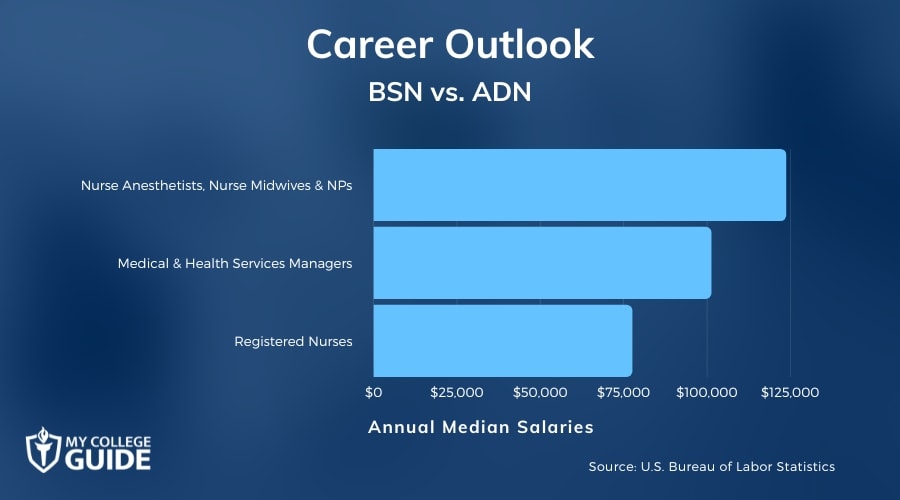If you’re considering a career in nursing, you may wonder about the differences between ADN vs. BSN degrees.

To become a registered nurse, you can choose one of two paths: pursue an associate degree in nursing (ADN) or pursue a Bachelor of Science in Nursing (BSN). You can take the National Council Licensure Examination (NCLEX) to become a registered nurse (RN) with either type of degree.
Editorial Listing ShortCode:
Both an ADN and a BSN help students develop essential nursing knowledge and skills. An associate degree usually takes only 2 years of school. A BSN degree program is generally a 4-year commitment but results in a higher academic credential, something hospitals across the country are seeking in greater numbers.
Read on to learn more about the differences between an associate vs. bachelor in nursing and determine if one of these degrees could be beneficial for you.
What’s the Difference Between ADN vs. BSN Degrees?

Both ADN and BSN programs prepare students for careers as registered nurses. Graduates with either degree can qualify for some of the same jobs, such as registered nurses in a hospital or outpatient care facility.
Editorial Listing ShortCode:
However, there are a few fundamental differences between the degrees. An ADN program typically takes two years to complete, while a BSN takes four years on average. Because BSN graduates get a more extensive education, they often qualify for more advanced and higher-paying positions than ADN holders. People with a BSN can also pursue graduate studies, which may lead to further career advancement.
What is an ADN Degree?

An associate degree in nursing (ADN) is a two-year program that teaches fundamental concepts and skills needed to care for patients. You’ll study anatomy and physiology, behavioral health, chemistry, microbiology, psychology, and other relevant subjects.
You’ll also gain hands-on experience working with actual patients by participating in clinical rotations. These learning experiences prepare you to take the National Council Licensure Examination (NCLEX-RN), which you’ll need to pass to become a practicing registered nurse.
An ADN can prepare you for a career as a registered nurse in numerous healthcare settings. For example, ADN holders can find employment in home healthcare agencies, hospitals, occupational health clinics, physician’s offices, and psychiatry clinics. Typical tasks of ADN nurses include administering medical treatment, creating medical records, and monitoring patients’ symptoms.
What is a BSN Degree?

A Bachelor of Science in Nursing (BSN) degree is a four-year program that allows you to gain a deeper understanding of medical concepts and develop more diverse nursing skills.
You’ll take a broader range of courses covering subjects like emergency care, medical ethics, nursing research, nursing theory, pharmacology, public health, and pharmacology. Like ADN students, you’ll complete clinical nursing experiences under the supervision of licensed nurses. BSN students also need to sit for the NCLEX-RN to obtain licensure.
A Bachelor of Nursing can unlock more diverse and potentially lucrative career opportunities than an ADN. You can use your degree to pursue nursing leadership, management, and research positions. Potential careers include health educator, ICU nurse, nurse manager, public health nurse, and more. Nurses with BSN degrees often take on more challenging duties than ADN nurses due to their higher level of education.
Key Differences Between an ADN vs. BSN

Now that you have a basic understanding of the differences between an associate in nursing vs. bachelors in nursing, let’s take a closer look at these degrees and their differences. Each educational path has unique curriculum requirements, career opportunities, job outlooks, and more.
Understanding these differences can help you select a suitable program that aligns with your career goals.
ADN vs. BSN: Curriculum

Both associate’s and bachelor’s in nursing programs have foundational courses that teach basic nursing skills and theories.
Typical classes for each degree include anatomy and physiology, fundamentals of nursing, and nursing process and documentation. These classes allow you to build clinical skills and can prepare you for an entry-level role in nursing.
Additionally, ADN and BSN curricula include nursing student clinical. These supervised hands-on learning experiences take place in healthcare settings, like a hospital or physician’s office. During a clinical, you’ll apply and expand the knowledge you gained in the classroom by caring for actual patients.
Editorial Listing ShortCode:
One notable difference is the number and range of required courses. A bachelor’s in nursing includes additional, higher-level courses not offered by associates in nursing programs. For example, BSN students may take critical thinking, global health, leadership, management, nursing informatics, and nursing theory classes.
The extra classes covered during a BSN program enable you to better understand nursing concepts and the complex issues impacting patients. This in-depth education may prepare you for advanced healthcare administrative and leadership positions.
ADN vs. BSN: Length of Education

The length of education is one of the most obvious differences between an associate vs. bachelor in nursing. The amount of time it takes you to earn a nursing degree can vary depending on your enrollment status, degree requirements, and other factors. However, you can typically complete an ADN faster than a BSN.
An ADN usually takes 18 to 24 months to finish if you enroll full-time. Community colleges and two-year colleges often offer ADN programs due to their shorter duration. Many people choose to enroll in an ADN program because they can enter the workforce and earn a salary more quickly.
A BSN typically takes 36 to 48 months for full-time students to finish. Some community colleges have BSN programs, but you could also enroll in a program at a traditional four-year college.
Many schools offer accelerated BSN programs for students who have already completed an ADN and obtained some work experience. Accelerated programs may also accept students who have already received a bachelor’s degree in another field, like biology or psychology.
Accelerated programs generally have more demanding course schedules, but they can substantially reduce the amount of time it takes you to earn a BSN. These programs often take 12 to 24 months to finish.
ADN vs. BSN: NCLEX Pass Rates

After you complete an ADN or BSN, you must pass the National Council Licensure Exam (NCLEX-RN) to start practicing as a registered nurse. BSN holders have slightly higher pass rates than ADN holders because they receive more comprehensive nursing education and training.
The NCLEX-RN is a comprehensive exam that assesses a broad range of nursing knowledge and skills. The exam includes 85 to 150 questions that cover four Client Need categories:
- Health promotion and maintenance
- Physiological integrity
- Psychosocial integrity
- Safe and effective care environment
According to the National Council of State Boards of Nursing (NCSBN), 82.95% of bachelor’s degree holders who took the NCLEX-RN passed the exam on their first attempt. By contrast, 78.92% of associate’s degree holders passed the exam for the first time that year.
Graduates of BSN programs perform better on the NCLEX-RN due to their more extensive coursework. ADN holders can still pass the exam, but they may need to study more independently to learn concepts not covered during their more limited classes.
If you want to increase your chances of passing the NCLEX-RN on your first attempt, enrolling in a BSN program could be a strategic choice.
BSN vs. ADN: Career Opportunities

Job opportunities are another factor to consider when comparing an associates in nursing vs. bachelors in nursing. Both degrees can prepare you for a fulfilling nursing career, but a BSN may make you eligible for a broader range of job opportunities.
An associate’s in nursing can qualify you for many entry-level nursing positions. Most ADN nurses work in hospitals. You can also use this degree to pursue employment as a home health nurse, hospice nurse, occupational health nurse, outpatient care nurse, rehab nurse, or travel nurse.
Editorial Listing ShortCode:
Graduates of BSN programs typically have training in nursing administration, leadership, and research. This more in-depth education may unlock new career opportunities. For example, BSN holders can pursue specialized nursing careers in gerontology, oncology, pediatrics, and other areas.
BSN nurses may secure healthcare administration and leadership roles. Possible job titles include clinical research nurse, forensics nurse, informatics nurse, nurse administrator, nurse case manager, nurse health coach, and operating room nurse. Your professional goals can help you determine whether an ADN or BSN is a more appropriate choice for you.
BSN vs. ADN: Roles and Scope of Practice

Nurses with ADN and BSN degrees often work alongside each other in healthcare facilities and perform many of the same duties. However, a professional with an associate’s degree in nursing has a more limited scope of practice than someone with a bachelors degree in nursing.
An ADN holder is a generalist with a foundational education in clinical skills and nursing theories. The standard duties of an ADN nurse include:
- Administering medications and vaccines
- Completing physical exams
- Consulting with physicians and specialists to develop treatment plans
- Educating patients about managing, preventing, and treating health conditions
- Performing diagnostic tests
- Taking health histories and updating medical charts
BSN nurse has the same responsibilities as ADN nurse, but they can take on more administrative and leadership duties due to their higher education level. Here are a few common BSN nurse tasks:
- Advocating for patients
- Coordinating patient care with a larger healthcare team
- Educating nursing students
- Implementing best nursing practices
- Promoting community and public health
- Supervising CNAs and other staff
Many healthcare facilities prefer to hire BSN nurses because they have a broader scope of practice and can perform more duties.
BSN vs. ADN: Salary and Job Outlook

An ADN or BSN can prepare you for an entry-level career as a registered nurse. According to the U.S. Bureau of Labor Statistics (BLS), registered nurses earn an average salary of $77,600 annually, or around $37 an hour. Your employer, location, and other factors can influence your salary.
Looking ahead, the BLS anticipates that job openings for registered nurses will grow by 6% over the next decade, which is as fast as the average for all careers. Graduates with a BSN may also qualify for more advanced positions, which generally offer more lucrative salaries. For example, the BLS reports that medical and health services managers earn a median salary of $101,340.
BSN nurses could choose to return to school to complete a master’s degree to boost their salary further. The BLS reports that nurse anesthetists, nurse midwives, and nurse practitioners earn a median annual wage of $123,780.
Editorial Listing ShortCode:
The demand for these positions will increase by 40% over the next 10 years. If you’re looking for a well-paying career, a BSN can set you up for graduate studies and future professional advancement.
Associates vs. Bachelors in Nursing Pros and Cons
Earning an ADN or BSN can enhance your resume, but each degree has pros and cons. Here are some factors to keep in mind when choosing a nursing degree.
| Associate’s Degree in Nursing | Bachelor’s Degree in Nursing |
Pros
|
Pros
|
Cons
|
Cons
|
Carefully weighing these benefits and drawbacks can help determine if an ADN or BSN best fits your goals and needs.
Is an ADN the Same as an RN?

There are several routes to becoming a registered nurse (RN). You can earn an associate’s or bachelor’s in nursing and pass the NCLEX-RN to enter this profession.
Some students choose to complete an RN diploma or certificate instead. You can earn these credentials by enrolling in a hospital nursing school. An RN diploma or certificate isn’t a degree, and these programs typically prioritize clinical experience instead of general education classes.
After completing an RN certificate or diploma, you can take the NCLEX-RN to become an RN. All three pathways can lead to a satisfying career as an RN.
Is a Nursing Degree Worth It?

Yes, a nursing degree is worth it for many students. Nurses often command high salaries, and the BLS predicts that the demand for many nursing careers will grow in the next 10 years. For example, openings for registered nurses will increase by 6%.
Those with associate’s or bachelor’s degrees in nursing can pursue many exciting career paths. A BSN may help you secure more advanced and specialized positions in healthcare administration, leadership, and research. Determining if a BSN is worth it really depends on your career goals and life situation.
Editorial Listing ShortCode:
A BSN program typically includes more than just hospital-based training. It usually incorporates training in leadership, management, and administration as well. In addition, those in nursing careers with a BSN have been linked to better patient outcomes, including lower mortality and failure-to-rescue rates, according to the American Association of Colleges of Nursing (AACN).
ADN or BSN – Which is Right for You?

Earning an ADN or BSN are two popular pathways to becoming a nurse. Each degree has advantages and disadvantages, so weighing your options carefully before applying to programs is essential. Associate degrees may get graduates into the job market faster, but bachelor degrees in nursing may improve career prospects in the long term.
Keep in mind that if you choose the ADN route, you can always complete your BSN later. Many colleges have BSN completion programs (also called an RN to BSN program) that you could participate in after entering the workforce. You can also get your BSN from accredited nursing programs online, which should help you to complete your BSN while working.
You can start your nursing journey by researching accredited universities with ADN and BSN programs.
